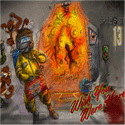|
I'm building some Twitter bots in Scala and thinking of trying to use akka for pub/sub so I only have one app sampling the Twitter stream publishing it to multiple subscribers of that stream. Is this a bad idea or should I use a real message queue? I have a few ideas for Twitter bots and they mostly all involve consuming a stream of tweets. Iím halfway towards implementing one of them, but right now I have a single Scala app that both samples the Twitter stream and then processes/saves tweets. If I eventually get to the point of multiple bots Iíd like to separate things out so I have only a single app that samples tweets and publishes them onto a queue of some kind, and then each app subscribes to that queue and acts on each tweet in its own way. Iíve looked at zeromq and a few other message queues but it looks like akka might be really simple to use for this kind of thing. I donít care if everything has to be written in Scala/Java, so I don't care if using something like zeromq means I can write the publisher in Java and subscribers in Python or something like that. It looks like I could publish tweets using an akka Event Bus and each bot would consume the event stream. This is all going to be on a single machine for now Ė some cheap Digital Ocean instance maybe Ė so I donít need any of the distributed-ness that I think akka could provide. At least not for a while. Has anyone used akka in this way? Is akka a bad fit for something like this? Should I stick to an actual queue like zeromq? Or if itís OK that everything is in Scala would it actually be really simple to use akka for this?
|
|
|
|

|
| # ? Apr 19, 2024 22:49 |
|
I can't really speak to much regarding Akka, as I have limited experience with it. However, consuming Twitter streams is probably the most common example project that I've seen for Storm, so maybe take a look at that.
|
|
|
|
Do you need persistence? Reliable delivery? Throttling/backpressure in case of slow consumers? If you don't need the features of a message queue product, don't use one. You can always add it later. There's an example project using akka's distributed pub/sub and sources on github.
|
|
|
|
Not sure about the Scala component but that also sounds like a prime Kafka use case.
|
|
|
|
Hughlander posted:Not sure about the Scala component but that also sounds like a prime Kafka use case. Kafka's the queue, not a language in which to write the consumer. If the goal is to be scalable at some point, I'd vote Spark Streaming as the consumer framework.
|
|
|
|
Sedro posted:Do you need persistence? Reliable delivery? Throttling/backpressure in case of slow consumers? If you don't need the features of a message queue product, don't use one. You can always add it later. Thanks. I don't need those things, and that looks like a good starting point for what I need. I think I had looked at this specific example before but after looking a little more closely after your suggestion I think it'll work out. I spent a few hours trying to get it working just now but can't seem to get my actors talking to each other across JVMs. Very frustrating. I oscillate back and forth between thinking Scala is great and thinking it's not for me because I'm a loving idiot who can't get anything working. I'll have to put this aside and try more later once I have a better understanding of akka. I'm mostly copying and pasting incantations without knowing what's going on.
|
|
|
|
how embarrassing for them: https://www.lightbend.com/blog/typesafe-changes-name-to-lightbend i understand this is about surviving as a company and thus catering to enterprise clients who are Java first, but stepping back from Scala is a little disheartening. the copy on that lovely website has also become completely impenetrable
|
|
|
|
sink posted:how embarrassing for them: https://www.lightbend.com/blog/typesafe-changes-name-to-lightbend This was always going to be a problem for them. The companies that hire consulting firms to build bespoke business software for them are not the ones pushing the adoption of new technologies.
|
|
|
|
I've just recently inherited a project in scala, what are the best resources to get going nowadays? I did a bit of the twitter scala school.
|
|
|
|
Scala School from Twitter is great, but getting quite dated now. There's a scala for java programmers tutorial on the scala-lang web site that's pretty good even if you aren't a java programmer.
|
|
|
|
If you're interested in messing around with apache spark and scala, databricks has a free community edition. https://databricks.com/try-databricks Unfortunately, databricks configures the spark cluster to their own specs, so optimizing lower level stuff is out of the question  I use it at work and I wish we'd bit the bullet and configured it ourselves. The shell access is a little borked and exploring the filesystem is a pain too. That being said, getting a handle on spark pays dividends - it's really fascinating all the things you can do. Does anyone here have ideas for scala projects for learning the language better? I do webdev and ETLs at work and I really did not like the Play framework.
|
|
|
|
WINNINGHARD posted:If you're interested in messing around with apache spark and scala, databricks has a free community edition. If you didn't like Play but would like to do app/service development in Scala, I'd take a look at the Twitter stack stuff. I've been working with it for just about 3 years now and have been pretty happy with it. Check out finagle/finatra.
|
|
|
|
Akka-HTTP is superior to Play. It's not great, but at least it's a true library that makes reasonable design decisions so that you can build anything you need on top of it. There's some stuff in it that is insanely obtuse and I blame the influence of akka-streams, which I have mixed feelings about. I like the idea of typed actors with backpressure and a bunch of prebuilt shapes. The Akka streams design just seems obtuse.
|
|
|
|
akka http is technically solid but has a terrible api. getting a req body as a stream sucks and is made way worse by the inability to return a stream or future. if i have to Await on it anyways just give me the body as a chunk of bytes
|
|
|
|
We're using Spark at work and though I usually write Sparkjobs in Java (where I'm decently competent) I thought I'd play around a bit with Scala, because it seems really nice. I'm very new and have dived right in without reading too much so I'm happily shooting myself in the foot every day. I do have some grounding in functional programming though. Say I have an Iterator[Tuple2[String, String]] and I want to get to a Map[String, TreeSet[String]] where every ._1 (first item in the tuple) is the key and the set for every key contains every ._2 for that key. Best I came up with is, pseudocodish: code:code:So im guessing I'm missing something obvious here and I'm creating way too many objects/maps/lists or something.
|
|
|
|
InAndOutBrennan posted:Best I came up with is, pseudocodish: You can: code:For the general pattern of "gee I have to transform my collection into these intermediate collections and I wish that I didn't", check out collection.breakOut (but as you're doing that to get groupBy here, it's not really helpful, just good to know). When you're doing really performance-critical stuff, sometimes the easiest option is to bite the bullet, do the disgusting mutable thing, then wrap it in immutable functional ivory towers so that nobody else has to see what you've done.
|
|
|
|
Mr. Showtime posted:You can: Thanks! I'm having some trouble with the "build yo map up by matching in here" put you've pointed me in a couple of interesting directions, breakout seems to be very interesting if I can get my head around it. Edit What I ended up with: code:InAndOutBrennan fucked around with this message at 14:06 on Jun 16, 2016 |
|
|
|
I've started trying to pick up scala. What's the praxis for choosing code:code:
|
|
|
|
Never use postfix ops (which is what calling getFile there without the dot is). They're ambiguous and don't really improve readability in any circumstance. If you want to use a trailing method call with infix invocation, you can group the infix part with parentheses.code:code:
|
|
|
|
I would avoid infix notation in general and use it only for simple binary expressions where it improves readability:code:code:
|
|
|
|
Cool, thanks all.
|
|
|
|
I would have:code:
|
|
|
|
I've got this code:code:I'm not sure why the for comprehension isn't actually yielding what I think it should be yielding. Any suggestions for what to look at? What am I missing?
|
|
|
|
Hypnobeard posted:I'm not sure why the for comprehension isn't actually yielding what I think it should be yielding. Any suggestions for what to look at? What am I missing? It's hard to tell what exactly is going on here without knowing what b, d, a, and fun are. That said, if this for comprehension always returns List(), then one of b, d(a), or fun(...) must be returning List() as well; since there are no elements in that list, it doesn't have anything to yield.
|
|
|
|
mutantmell posted:It's hard to tell what exactly is going on here without knowing what b, d, a, and fun are. Well, that's why I included the types for those in the code sample. The first two elements all produce something when tried independently, so there's something off in the recursion, but I'm not sure where the flat List() is coming from--I'd expect to see List(List()) if there was no data. Debugging in the scala ide isn't helping, either.
|
|
|
|
Hypnobeard posted:Well, that's why I included the types for those in the code sample. The first two elements all produce something when tried independently, so there's something off in the recursion, but I'm not sure where the flat List() is coming from--I'd expect to see List(List()) if there was no data. Debugging in the scala ide isn't helping, either. If any of the lists on the right of the '<-' is empty, then the result will be 'List()'. The for-comprehension can be read as "for each element foo in b, for each element bar in d(a), for each element baz in fun(q - foo), transform it into bar :: baz)'. If any of those lists are empty, then it cannot do anything. It may help the debugger if you manually do the de-sugaring of the for comprehension. I'll put in a spoiler in case you want to do it yourself: b.flatMap { foo => d(a).flatMap { bar => fun(q - foo).map { baz => bar :: baz } } }
|
|
|
|
mutantmell posted:If any of the lists on the right of the '<-' is empty, then the result will be 'List()'. The for-comprehension can be read as "for each element foo in b, for each element bar in d(a), for each element baz in fun(q - foo), transform it into bar :: baz)'. If any of those lists are empty, then it cannot do anything. Thanks! I'll try this out today.
|
|
|
|
Is baz a List[String] or is fun(q - foo) a List[String]?
|
|
|
|
KernelSlanders posted:Is baz a List[String] or is fun(q - foo) a List[String]? Turned out the method I was using to calculate (q - foo) was the culprit--fixing that resolved everything else.
|
|
|
|
Alrighty, I'm trying to gently caress around with generics and reflection, via TypeTag, to try and retain type information on runtime: http://pastebin.com/Cj6z2Ez4 (It's best to download this file and feed it into the 'scala' command. If you copy and paste it into the REPL, it behaves differently.. I'm on 2.11.8) As commented, line 11 loses type information because of the generic type declaration in line 6. If I remove that declaration everything works as expected, but for various reasons, let's say that I have to have it there and that I can't manually declare types on line 11 (because realistically, I wouldn't know what kinda of type I'd be getting.) Is there some way for me to use the underscore/wildcard type in conjunction with TypeTag to keep the type information down that chain of calls? krnhotwings fucked around with this message at 06:21 on Aug 25, 2016 |
|
|
|
So I have a list of tuples that looks like (a, (b, x)). I want as a result a map of a to (b, x) where x is the greatest x for that given a and b combo. Basically, if the x I'm examining is greater than the greatest x so far for that a as well as that b, update the result map with the a, (b, x) combo. I have legitimately no idea how to approach this. It seems like I should be able to do this with foldLeft, am I crazy?
|
|
|
|
Good Will Hrunting posted:So I have a list of tuples that looks like (a, (b, x)). I want as a result a map of a to (b, x) where x is the greatest x for that given a and b combo. Basically, if the x I'm examining is greater than the greatest x so far for that a as well as that b, update the result map with the a, (b, x) combo. I have legitimately no idea how to approach this. It seems like I should be able to do this with foldLeft, am I crazy? foldLeft is a good approach. You can use a map as an accumulator, keyed by (a, b) tuples. You would start with an empty map, and compare the value of X for each element in your list. If X is greater, add it to the map, otherwise continue. code:
|
|
|
|
Sedro posted:Good Thanks for this. Basically, my input is something like [ (A, (B, X)), (A, (C, X)), (A, (D, X), (A, (C, Y)), (A, (C, Z)))] and so on. It's a mapping of an Id, to tuples containing a value and a timestamp for that value. I have no choice as to how that's represented, but I do have some leeway over how I process it and reach my desire result of Map[A, (C, (maximum of X, Y, Z)]. This is one of the harder things I've done in Scala so far (I'm using Spark) but it's really neat and I'm enjoying it so far.
|
|
|
|

|
| # ? Apr 19, 2024 22:49 |
|
On my tablet at the moment, and don't have my laptop handy, but you could try something like:code:
|
|
|



















